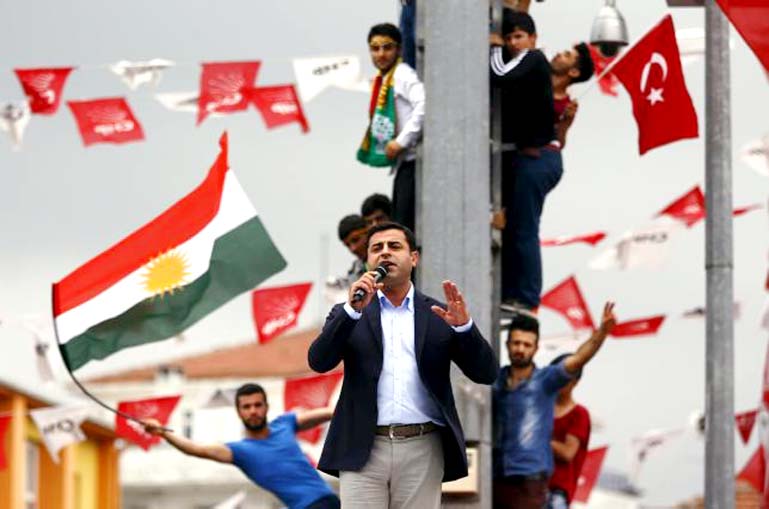
Reuters , Diyarbakir :
Selahattin Demirtas, co-chairman of the pro-Kurdish Peoples’ Democratic Party (HDP), speaks as his supporters wave Kurdish (L) and Turkish national ® flags in the background.
The head of Turkey’s pro-Kurdish opposition party accused the government on Wednesday of deliberately standing aside while violence grew in the mainly Kurdish southeast after elections that robbed the ruling AK Party of its overall majority.
Two people were injured overnight, bringing the total wounded to seven as tensions remained high in the predominantly Kurdish city of Diyarbakir, just days after the election ushered Turkey’s ethnic Kurds into parliament.
Selahattin Demirtas, head of the Peoples’ Democratic Party (HDP), told reporters in Ankara the government and President Tayyip Erdogan had kept silent in order to undermine his party’s success in Sunday’s vote.
“People are taking steps to push the country into a civil war, and the prime minister and president are nowhere to be seen,” said Demirtas, whose HDP won 13 percent to become the first Kurdish party to clear parliament’s threshold, depriving the ruling AK Party of a majority to rule alone.
It must now, after 13 years single-party rule, seek a coalition partner, something unlikely to appeal to Erdogan’s preference for strong, unchallenged leadership.
“You would think they are waiting to allow the country to slip into civil war so they can say, ‘Look at how valuable the AKP is,'” Demirtas said.
Aytac Baran, the leader of Islamic aid association Yeni Ihya-Der was shot dead on Tuesday as he left his office in Diyarbakir. His foundation is linked to the Kurdish Islamist political party Huda Par, which draws support from sympathisers of Hizbullah, an outlawed militant group.
Rivalry between outlawed Hizbullah-linked Islamist Kurds and the leftist, autonomy-seeking Kurdistan Workers Party (PKK) dates back to the 1990s – the height of the PKK’s armed campaign for self-rule that began in 1984 and claimed 40,000 lives before a ceasefire was declared in 2013.
Supporters of Huda Par said on Tuesday the attack was carried out by PKK sympathisers.
But the PKK denied it was behind the murder, saying in an emailed statement it was a provocation aimed at intimidating Kurds and undermining the electoral success of HDP, whom the government accuses of links with the PKK.
The HDP says it suffered 140 violent attacks during the election in an orchestrated effort to link it to violence, including the bombing of a political rally in Diyarbakir on June 5 that killed three people.
Demirtas said almost all of the attacks originated from a single “centre”. He has also said the bombers had links with Islamic State militants in Syria.
Selahattin Demirtas, co-chairman of the pro-Kurdish Peoples’ Democratic Party (HDP), speaks as his supporters wave Kurdish (L) and Turkish national ® flags in the background.
The head of Turkey’s pro-Kurdish opposition party accused the government on Wednesday of deliberately standing aside while violence grew in the mainly Kurdish southeast after elections that robbed the ruling AK Party of its overall majority.
Two people were injured overnight, bringing the total wounded to seven as tensions remained high in the predominantly Kurdish city of Diyarbakir, just days after the election ushered Turkey’s ethnic Kurds into parliament.
Selahattin Demirtas, head of the Peoples’ Democratic Party (HDP), told reporters in Ankara the government and President Tayyip Erdogan had kept silent in order to undermine his party’s success in Sunday’s vote.
“People are taking steps to push the country into a civil war, and the prime minister and president are nowhere to be seen,” said Demirtas, whose HDP won 13 percent to become the first Kurdish party to clear parliament’s threshold, depriving the ruling AK Party of a majority to rule alone.
It must now, after 13 years single-party rule, seek a coalition partner, something unlikely to appeal to Erdogan’s preference for strong, unchallenged leadership.
“You would think they are waiting to allow the country to slip into civil war so they can say, ‘Look at how valuable the AKP is,'” Demirtas said.
Aytac Baran, the leader of Islamic aid association Yeni Ihya-Der was shot dead on Tuesday as he left his office in Diyarbakir. His foundation is linked to the Kurdish Islamist political party Huda Par, which draws support from sympathisers of Hizbullah, an outlawed militant group.
Rivalry between outlawed Hizbullah-linked Islamist Kurds and the leftist, autonomy-seeking Kurdistan Workers Party (PKK) dates back to the 1990s – the height of the PKK’s armed campaign for self-rule that began in 1984 and claimed 40,000 lives before a ceasefire was declared in 2013.
Supporters of Huda Par said on Tuesday the attack was carried out by PKK sympathisers.
But the PKK denied it was behind the murder, saying in an emailed statement it was a provocation aimed at intimidating Kurds and undermining the electoral success of HDP, whom the government accuses of links with the PKK.
The HDP says it suffered 140 violent attacks during the election in an orchestrated effort to link it to violence, including the bombing of a political rally in Diyarbakir on June 5 that killed three people.
Demirtas said almost all of the attacks originated from a single “centre”. He has also said the bombers had links with Islamic State militants in Syria.

